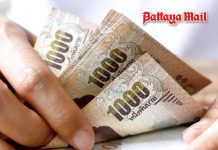Thai and other stock markets have risen on hopes that the United States will reach a deal on raising its debt ceiling.
Thai composite index opened higher following gains on Wall Street. The US markets closed up by more than 2%, buoyed by news that Republicans in the US House of Representatives had met with President Barack Obama amid renewed efforts to avert a looming debt crisis.
Since early October, there have been concerns that a failure to agree on a deal to raise the debt limit may see the US default on its payments and hurt the global economy.
The Finance Ministry earlier affirmed to local businesses that the partial US government shutdown will only have a slight impact on the Thai economy. They asserted that investors were not surprised by the phenomenon, adding that foreign capital has flowed back into the Asian market.
Prime Minister Yingluck Shinawatra has previously urged the National Economic and Social Development Board and the Financial Ministry to closely monitor the situation in the US, after it had been reported that the Government Shutdown might stagnate American economy in the third quarter by 0.1 percent.
Most economists see limited direct impact from the US shutdown, which has cut off funding for non-essential federal tasks. Bank of Thailand Governor Prasarn Trairatvorakul previously told a government meeting that the conditional US government funding would be short-term.
While the Thai currency has strengthened following the announcement, the main concern remains whether the US can expand its debt ceiling by October 17 in a bid to avoid a default. The outcome will have an impact on the monetary and stock markets worldwide.
Analysts said that if the shutdown is followed by a default on the federal debt, which could happen in a month if Congress does not act, foreign investors would start to worry about the strength of the U.S. economy. They could lose confidence in the U.S. ability to repay its loans, triggering higher interest rates from foreign lenders.
Under these circumstances, the US Federal Reserve is widely expected to maintain its bond-buying programme at the current rate of $85 billion a month to boost the economy. This will further propel liquidity into emerging markets, and may boost the Thai stock market as well as the dollar/baht exchange rate as in the first four months of this year.




